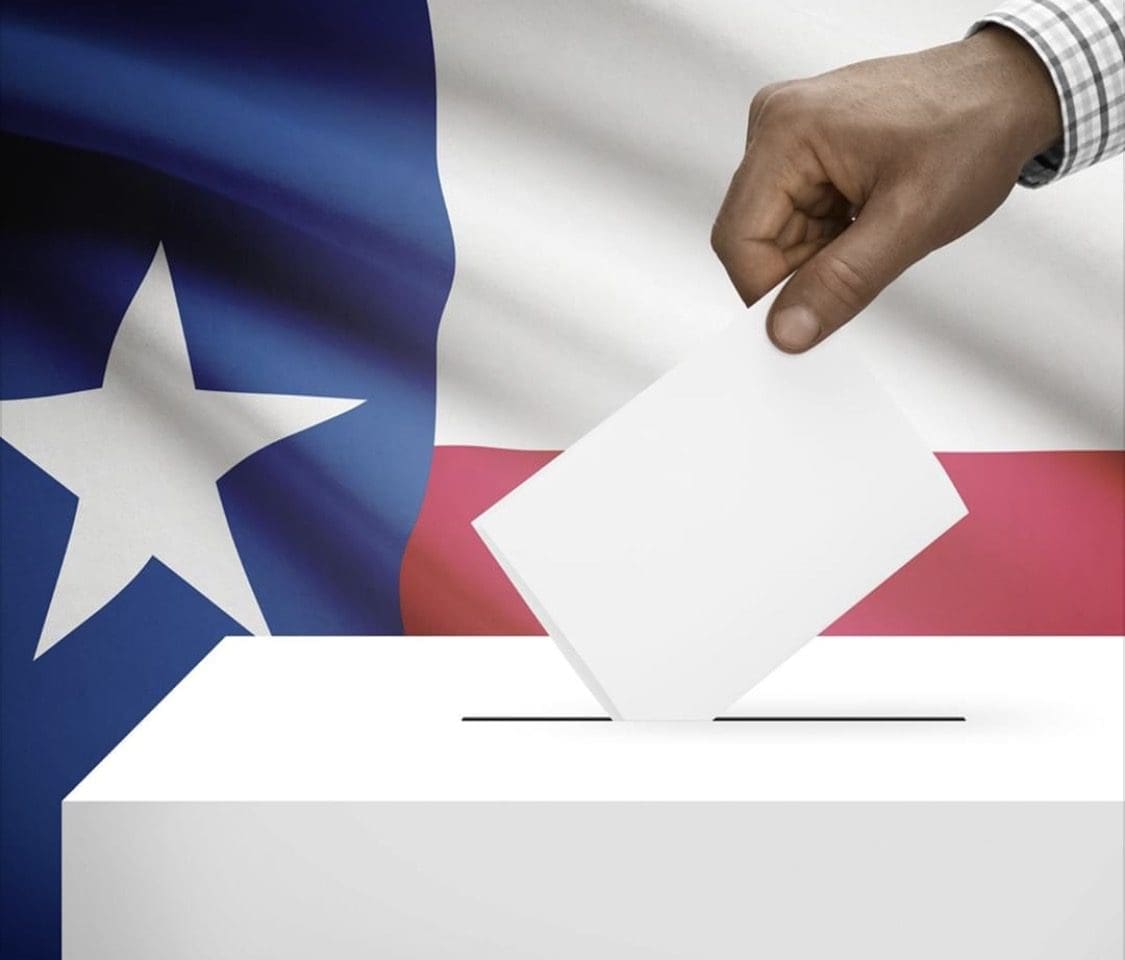Texas grassroots advocates are concerned that “reluctant” Republican lawmakers in the state House are preventing their priority election integrity legislation from advancing in time to reach the governor’s desk.
With four weeks remaining in the 20-week regular legislative session, the state Senate has passed more than a dozen Texas GOP priority measures to protect elections, yet the Texas House has passed just one GOP-priority proposal to strengthen election laws.
“There is a very small contingent of people within the party (yes, Republicans) who do not want these bills to see the light of day,” said Jill Glover, head of the Republican Party of Texas Legislative Priorities Committee, in a recent update on the status of the party’s priority bills.
Securing elections is one of the Texas GOP’s eight legislative priorities selected by party convention delegates last summer, and 95 percent of Republican primary voters (1.8 million votes) supported the issue in March 2022.
Concerns about election security continued to grow in the months leading up to the legislative session.
“During the November 2022 general election, we saw many issues arise in two of our largest counties, Harris and Dallas, indicating a need for new legislation to address voting fraud and election irregularities,” Glover said.
Yet the lone House-passed measure simply undoes a change made by the Legislature two years ago that weakened the state’s election laws.
Glover said that while the Senate has passed legislation addressing many of the RPT’s election concerns, the House Elections Committee chaired by State Rep. Reggie Smith (R–Van Alstyne) “appears to be reluctant to vote out any bills that address our priority.”
She urged swift action on bills that align with four key party priorities.
Restore Felony Penalties for Illegal Voting
Last week, the House finally passed its first GOP-priority election measure: House Bill 1243 by State Rep. Cole Hefner (R–Mount Pleasant), which would restore felony penalties for illegal voting offenses. HB 1243 was referred to the Senate State Affairs Committee on Monday.
A similar measure, Senate Bill 2 by State Sen. Bryan Hughes (R–Mineola), passed the Senate on March 14 and was referred to the House Elections Committee on April 10.
Ban Ranked-choice Voting
Ranked-choice voting, also called preferential voting, allows voters to rank candidates for an elected office in order of preference, eliminating the need for a runoff election in the event no candidate receives a majority of votes. Proposed legislation banning the use of ranked-choice voting is stalled in the House Elections Committee.
Senate Bill 921 by Hughes passed the Senate on March 28 and was referred to the House Elections Committee on April 3.
House Bill 3611 by State Rep. Briscoe Cain (R–Deer Park) received a public hearing on March 30 and was left pending in the Elections Committee.
Revise Interstate Crosscheck Requirements to Remove Texas from ERIC
State law requires Texas to compare its voter rolls with other states to identify duplicates. Only one interstate crosscheck program currently exists: the Electronic Registration Information Center. Recently, some Republicans in Texas and other states have become dissatisfied with ERIC, and the Texas secretary of state’s office began developing an in-house crosscheck program. Proposed legislation, also stalled in the House Elections Committee, sets new parameters for participating in a crosscheck program that would eliminate ERIC as an option.
Senate Bill 1070 by Hughes passed the Senate on April 12 and was approved by the Elections Committee on April 24, but it has not yet advanced to the House Calendars Committee.
House Bill 2809 by State Rep. Jacey Jetton (R–Richmond) received a hearing on April 20 and was left pending in the Elections Committee.
Eliminate Countywide Voting
Proposed legislation would return in-person voting back to precinct-based polling locations.
House Bill 5231 by State Rep. Tony Tinderholt (R–Arlington) was referred to the House Elections Committee on March 24 but hasn’t received a hearing.
House Calendar
Once bills are approved by the Elections Committee, they must go to the House Calendars Committee, where lawmakers decide if and when legislation is sent to the full House for consideration. House measures that pass the chamber must then repeat the process in the Senate.
Time is running short for House bills to advance through both chambers.
Based on the chamber’s self-imposed deadlines, a House bill needs to be voted out of committee by May 5 (Day 116 of the 140-day session) in order to have a realistic chance of getting placed on the calendar in time to receive a vote on the House floor by the May 11 cutoff (Day 122).
As of May 1, 34 bills had moved out of the House Elections Committee; three are Texas GOP priority election bills.
Senate Election Bills Moving Through the House
On Thursday, May 4, the House Elections Committee will hear public testimony on half a dozen Senate bills, including two GOP priorities authored by State Sen. Paul Bettencourt (R–Houston) in response to a string of botched elections in Harris County.
Senate Bill 1039 requires local election officials to respond to citizens’ complaints about election irregularities or face possible audits and other remedial action from the state. The Senate passed a similar measure last session, but the House ignored it. SB 1039 passed the Senate on April 13.
Senate Bill 1911 increases the penalties for intentionally failing to deliver election supplies to a polling place, obstructing distribution of election supplies, and revealing election results before polls close. The Senate passed SB 1911 on April 13.
The committee will also consider Senate Bill 1599 by Hughes, which revises various procedures for processing mail-in ballots and clarifies that voters’ signatures must be verified even when ID numbers on an application and ballot match. The Senate passed SB 1599 on April 17.
Also on Thursday’s agenda is Senate Bill 1807 by State Sen. Drew Springer (R–Muenster), which adds a civil penalty to last session’s law prohibiting officials from altering election laws or procedures. The Senate passed SB 1807 on April 19.
Other GOP-priority Election Bills
Several other GOP-priority election security measures are awaiting action by House committees.
House Bill 1671 by Jetton would make vote harvesters civilly liable for monetary damages to any candidates harmed by the harvesting. The Elections Committee approved HB 1681 on April 27 but has not yet sent it to the Calendars Committee.
House Bill 2020 by State Rep. Tom Oliverson (R–Cypress) allows the secretary of state to suspend a county elections administrator if certain problems become a recurring pattern. HB 2020 was heard in the Elections Committee on March 30 and left pending. A companion, Senate Bill 823 by Bettencourt, passed the Senate State Affairs Committee on April 6.
House Bill 5053 by State Rep. Mano DeAyala (R–Houston) allows election crimes to be prosecuted in adjoining counties or judicial districts. HB 5053 was approved by the Elections Committee on April 18 and sent to the Calendars Committee on April 19. A companion, Senate Bill 2208 by State Sen. Tan Parker (R–Flower Mound), passed the Senate on April 27 and was referred to the House Elections Committee on April 28.
House Bill 5180 by State Rep. Terry Wilson (R–Georgetown) clarifies current law allowing public access to election records. HB 5180 was sent to the House Local and Consent Calendar Committee on May 1.
Senate Bill 1600 by Hughes requires proof of citizenship when registering to vote. SB 1600 passed the Senate on April 18 and was referred to the House Elections Committee on April 24.
Senate Bill 1846 by State Sen. Brandon Creighton (R–Conroe) prohibits voting system manufacturers from contracting for software with any entity based in China, Cuba, Iran, North Korea, or Russia. SB 1846 passed the Senate on April 20 and was referred to the House State Affairs Committee on April 28.
Senate Bill 1907 by Bettencourt increases the criminal penalty for failing to deliver precinct election returns by the statutory deadline and allows the secretary of state’s office to supervise completion of the returns. SB 1907 passed the Senate on April 6 and was referred to the House Elections Committee on April 18.
Senate Bill 1910 by Bettencourt prevents election officials from using a litigation exception to deny public access to election records. SB 1910 passed the Senate on April 4 and was referred to the House State Affairs Committee on April 17.
Senate Bill 1927 by Hughes authorizes the office of the state prosecuting attorney to prosecute election crimes statewide. SB 1927 was placed on the Senate intent calendar on April 5.
Senate Bill 1950 by Bettencourt prohibits an election official from suspending any mail-in ballot acceptance requirements and creates a Class A misdemeanor for offenders. SB 1950 passed the Senate on April 6 and was referred to the House Elections Committee on April 18.
Senate Joint Resolution 35 by State Sen. Brian Birdwell (R–Granbury) proposes a state constitutional amendment clarifying that a Texas voter must be a United States citizen. SJR 35 passed the Senate on March 27 and was referred to the House State Affairs Committee on April 10.
The House deadline for passing Senate bills is May 23 (Day 134). But if the House makes any changes to a Senate bill, the amended version must go back to the Senate for final approval, requiring extra time.
Several Texas GOP priority election integrity bills were never considered by either chamber.
The last day of the regular legislative session is May 29.





